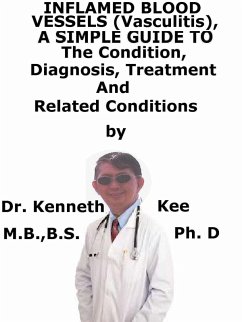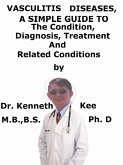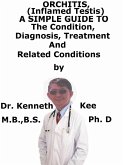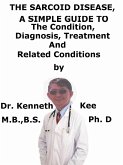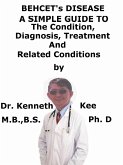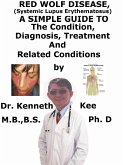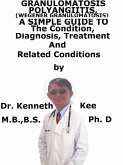Vasculitis is an inflammatory condition of the blood vessels
Inflammation may involve pain, redness, warmth in the affected tissues.
If a blood vessel is inflamed, it can cause narrowing
Poor blood flow may cause cells of organs to stop living
Vasculitis can affect the arteries, veins and capillaries
Large blood vessel inflammation include Takayasu's Arteritis
The moderate blood vessels include Kawasaki and Polyarteritis
The small blood vessel includes Henoch Schonlein purpura and polyangiitis
Diagnosis is by the microscopic examination of the blood vessel biopsy
Angiography of the inflamed blood vessels is also diagnostic.
Treatment of vasculitis includes corticosteroids and cytotoxic medicines.
The goal is to stop the immune response that caused the inflammation.
-An original poem by Kenneth Kee
Vasculitis is a disorder that involves inflammation in the blood vessels.
Inflamed Blood Vessels (Vasculitis) happens if the immune system attacks the blood vessels by mistake.
This attack may happen as the result of an infection, a medicine, or another disease or disorder.
"Inflammation" indicates the body's response to injury, such as injury to the blood vessels.
Inflammation may involve the pain, redness, warmth, swelling and the loss of function in the involved tissues.
In vasculitis, inflammation can lead to serious problems.
Complications are dependent on which blood vessels, organs, or other body systems are involved.
Vasculitis can have an effect on any of the body's blood vessels.
These are arteries, veins, and capillaries.
Arteries bring the blood from the heart to the body's organs.
Veins bring the blood from the organs and limbs back to the heart.
Capillaries join the small arteries and veins.
If a blood vessel is inflamed, it can become narrow or close off.
This restricts or prevents blood flow through the vessel.
Rarely, the blood vessel will expand and weaken, causing it to bulge.
This bulge is termed an aneurysm
The interruption in blood flow produced by inflammation can injure the body's organs.
Signs and symptoms are dependent on which organs have been injured and the extent of the injury.
The normal symptoms of inflammation such as fever, general aches and pains are frequent among people who have vasculitis.
The types of vasculitis often are clustered based on the size of the blood vessels they affect.
The most frequent type (polymyalgia rheumatica (PMR)) had an estimated cumulative prevalence (the number of people who had ever had the disease over a given period of time) of 2.27%.
The matching figure for the next most frequent (giant cell arteritis (GCA)) was 0.41%
1. Mostly Large Vessel Vasculitis
Behcet's Disease
Giant Cell Arteritis
Polymyalgia Rheumatica
Takayasu's Arteritis
Cogan's Syndrome
2. Mostly Medium Vessel Vasculitis
Buerger's Disease
Kawasaki Disease
Polyarteritis Nodosa
Central Nervous System Vasculitis
3. Mostly Small Vessel Vasculitis
Churg-Strauss Syndrome
Henoch-Schonlein Purpura
Essential Mixed Cryoglobulinemia
Hypersensitivity Vasculitis
Microscopic Polyangiitis
Wegener's granulomatosis
Causes:
Vasculitis can be:
1. Primary (happening on its own), or Idiopathic (45-55%)
2.Secondary (as a result of infection, or in link with another disorder such as rheumatoid arthritis).
Some forms of vasculitis seem to happen more often in people who:
a.Have medical disorders, such as chronic hepatitis B or C infection
b.Have autoimmune diseases such a lupus, rheumatoid arthritis, and scleroderma
c.Smoke
Medicines used to treat vasculitis are:
1.Corticosteroids
2.Cytotoxic
3.Immunotherapy
TABLE OF CONTENT
Introd...
Dieser Download kann aus rechtlichen Gründen nur mit Rechnungsadresse in A, B, CY, CZ, D, DK, EW, E, FIN, F, GR, H, IRL, I, LT, L, LR, M, NL, PL, P, R, S, SLO, SK ausgeliefert werden.

